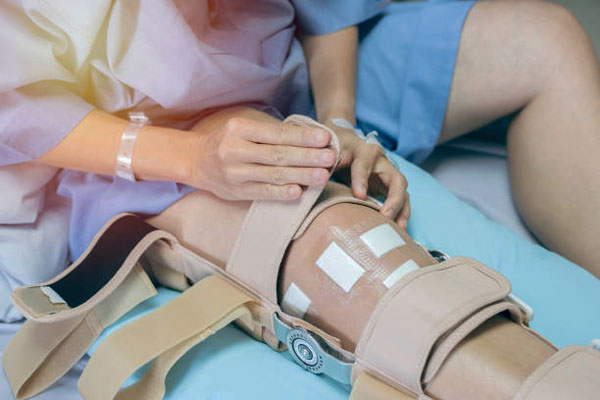Posterior Cruciate Ligament (PCL) Injury
There are four major ligaments located within the knee. One of these joins the intercondylar region of the tibia to the medial condyle of the femur from behind. This ligament is known as the posterior cruciate ligament. The PCL is considered to be stronger and larger than the anterior cruciate ligament (ACL). PCL injuries comprise 20% of the total injuries occurring to knee ligaments.

What are the causes of PCL?
Quite often, a PCL injury may damage other ligaments and cartilage in the knee. There are also reports of cases where a ligament may cause a bone to come off. Some of the causative factors of PCL are given below:
- A fall on the knee in the bending position.
- Hitting the knee against the dashboard in an auto accident.
- An injury occurring while playing sports like football, baseball, soccer, or skiing.
What are the grades of PCL tear?
Based on the severity PCL injury it is classified into 4 grades:
- Grade I: It is a mild injury caused by limited damage of the PCL. Although, this can change the shape of PCL, they do not affect the functioning and stability of the knee.
- Grade II: In this grade, the PCL is partially injured and the stability of the knee is also affected to some extent.
- Grade III: The ligament is completely torn, and the knee becomes more unstable.
- Grade IV: This is the most severe form of injury where another ligament is also damaged along with the PCL.
What are the symptoms of PCL injury?
Most people consider PCL to be a minor injury and continue their daily life activities. Over time, people with PCL injuries may experience the following symptoms:
- Knee pain
- Difficulty while walking
- Instability in the knee
- Stiffness of the knee
What are the ways to diagnse PCL injury?
Diagnosis of PCL injury will include the following:
- Background information: The doctor will review your medical history by asking a few questions regarding the condition of your knee during the injury. Additionally, the doctor will ask you about your symptoms, existing medical conditions, current medications, and social habits.
- Physical examination: In order to know whether it's a PCL injury, your doctor will recommend that you lie down, resting on your back, with your knees bent. This allows the doctor to press the knee and the area of the upper shin. Your doctor may ask you to walk around. Any abnormality in knee movement during this check-up suggests a PCL injury. Another way of checking the condition is by using an arthrometer (a medical device to measure joint movements). This device is held close to the leg to check the degree of abnormal mobility.
- Imaging techniques: An X-ray is recommended to check if there is any bone fracture. An X-ray is not able to detect a ligament injury, so an MRI is done to obtain information about the PCL tear. The images obtained help to get a clear picture of the exact location of the injury.
What are treatment options for PCL injury?
PCL injuries do not require any surgical intervention, especially if it is a grade I or II injury. Some people have to undergo physical therapy as part of their treatment plan. The process may include the following:
- Using crutches while walking.
- Using the assistance of a machine will help in the free movement of the leg.
- Wearing knee braces to support the leg.
- Strengthening thigh muscles by walking or running on a treadmill.
Symptomatic PCL injuries will require reconstruction using an allograft or a graft taken from some other part of the knee to substitute for the lack of PCL, and this can be done arthroscopically.
Self-care
A minor PCL injury can be effectively managed by following the PRICE approach. Pricing entails the following steps:
- Protecting the knee from further injuries.
- Resting the knee adequately.
- Icing the injured part with cold compress at regular intervals.
- Compressing the knee with an elastic bandage.
- Elevating the knee above your heart level.
Sometimes, to treat the knee pain, painkillers may be administered.